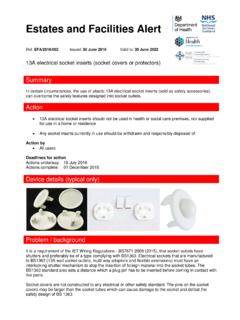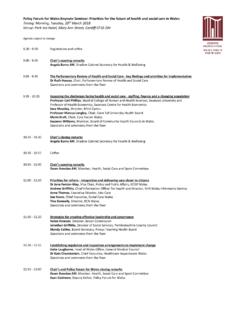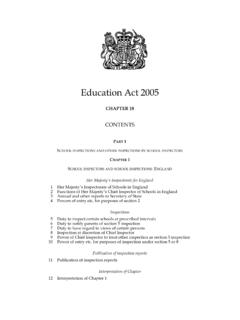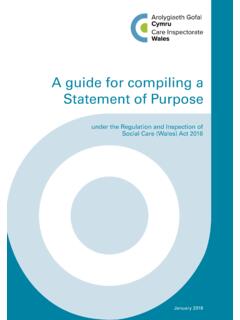Transcription of THE CARE STANDARDS ACT 2000 - Pathways …
1 BriefingTHE care STANDARDS ACT 2000 AND 'SUPPORTING PEOPLE'For people with learning disabilities their income and the financial support for servicesdepends on whether they live in a registered care home or in housing perhaps with additionalsupport. The criteria for registration of care homes and their supervision is dealt with in thenew care STANDARDS Act 2000 . Housing with support is now dealt with under new SupportingPeople arrangements for support care STANDARDS ACTThe care STANDARDS Act 2000 was passed on 20 July 2000 . The Act aims at extending theregulation of social care and follows on from two white papers published by the Governmentin 1998 and 1999 entitled Modernising Social services and Building for the Future.
2 Careservices in the housing sector range from residential care homes and nursing homes todomiciliary care . Up until now this range of care services has been regulated under theRegistered Homes Act 1984. The 1984 Act was passed to protect the welfare of vulnerableadults in residential care in the private current arrangements under the 1984 Act are unsatisfactory. There is a lack ofconsistency in the way the regulations are applied and there are some forms of supportedhousing, which are not being regulated, which ought to be. The aim of the care StandardsAct 2000 is to make sure that the care of vulnerable people, in different types of supportedhousing is properly regulated, to improve care STANDARDS and introduce consistency in theregulation of services The main changes introduced by the Act For the first time local authorities will have to be regulated and meet the same carestandards as independent sector providers.
3 The Act introduces a new, independent regulatory body for social care known as theNational care STANDARDS Commission. The NCSC will monitor care homes on a nationalbasis and they will no longer be regulated by local inspectorate units. The Government has the power to introduce minimum care STANDARDS The Act establishes a general social care council for England and a care council for councils will register social care workers, regulate the training of social workers andraise STANDARDS in social care through codes of conduct and practice. Domiciliary care agencies will be registrable.
4 Any organisation arranging for people intheir homes to receive personal care must be Definition of a care homeA major change is the new definition of a care home, which must be will be registrable if care is being provided and that care includes assistancewith bodily functions, where such assistance is required. The important factor will be whetheror not assistance is available. If it is and personal care in the wider sense is actually beingprovided, the accommodation will constitute a care home and be it does not appear in the Act another factor which will be relevant is that officialshave from the DoH implementation team and ministers have said that the definition is notintended to apply to someone's own home whether this is tenanted or owned outright.
5 Ifsomeone holds a tenancy it is difficult to see how the rights conveyed under a tenancy can beconsistent with the management requirements for registered care homes. A tenancy can be ofself contained accommodation or of a room with some shared living space. If the landlordintends to create a tenancy, an agreement has been offered and rent paid it is not easy to seehow this can be treated as a registered care home. It can however be regulated under the newarrangements for domiciliary Act does not define personal care , but it says that personal care does not include anyactivity prescribed by regulation.
6 So it will be possible for the Government to excludeparticular activities that might otherwise be considered to amount to personal Financial consequencesIf a scheme is registered under current legislation, there are financial consequences. Residentsin registered homes are not entitled to housing benefit. The cost of providing accommodationis paid in total by the local authority which has placed the person in the residentialaccommodation being provided and the individual has a small ImplementationThe care STANDARDS Act sets out the framework but the detailed operational requirements willbe introduced by regulation.
7 The current Residential care Homes Regulations 1984 are beingreviewed by the Department of Health s Social care Policy Group. The Department of Healthexpects to make available first consultation documents on national minimum STANDARDS thisAutumn. This will be followed by other topics for headline dates we are working to at the present are as follows: "Fit for the Future" STANDARDS published - Summer 2000 Consultation on minimum STANDARDS and regulations - Autumn 2000 Commission legally established - March 2001 Minimum STANDARDS and Regulations Published - Apr 2001 onwards Staff transfer to NCSC - 1 April 2002 NCSC takes over regulatory duties from Local Authorities and Health Authoritiestogether with new regulatory duties - 1 April 2002 There is a National care STANDARDS Commission Implementation Team in the Social CareDivision at the Dept of Health.
8 Details can be found on the government website includingmembers of the team and contact Problems with registration and inspection arrangements:The Audit Commission in Home Alone (1998) commented upon: the lack of regulation outside registered care sheltered housing the variation in registration requirements and the need for national STANDARDS residents being financially worse off in registered care clearer definition required for 'residential care ' and the requirement to registerIn the case of people with learning disabilities 75% of those receiving accommodation andsupport are in registered care homes but this varies widely in different part of the system has been useful in eliminating the obviously poor providers introducing a degree of independent
9 Supervision providing some protection for vulnerable people although the Longcare report showedhow this could fail asserting the need for good material STANDARDS , eg facilities, fire precautions etc. simple tests and inspections which can identify weaknessesBut is seen to be weak because of: the inconsistency of the requirement to register and STANDARDS applied management and accommodation STANDARDS which can be incompatible with achieving anordinary domestic environment and resident choice and control the incompatibility of tenants' rights with the degree of supervision required forregistration limitations for residents - disposable income, access to benefits, incentive to work.
10 Independence and ordinary living registered care with a different financial structure from housing plus support failure to take account of the diversity of types of service and residentsThere are potential problems with Supporting People arrangements for funding where peopleresident in a residential care home are unlikely to be eligible. Depending on the interpretationof 'personal care ' the Act could require the registration of homes not at present RecommendationsPeople with a learning disability should be helped to have their own home. The governmentaim of promoting independence and less reliance on registered care will be frustrated ifservices providing housing care and support are fitted into a residential care home model forregulation and administration.







